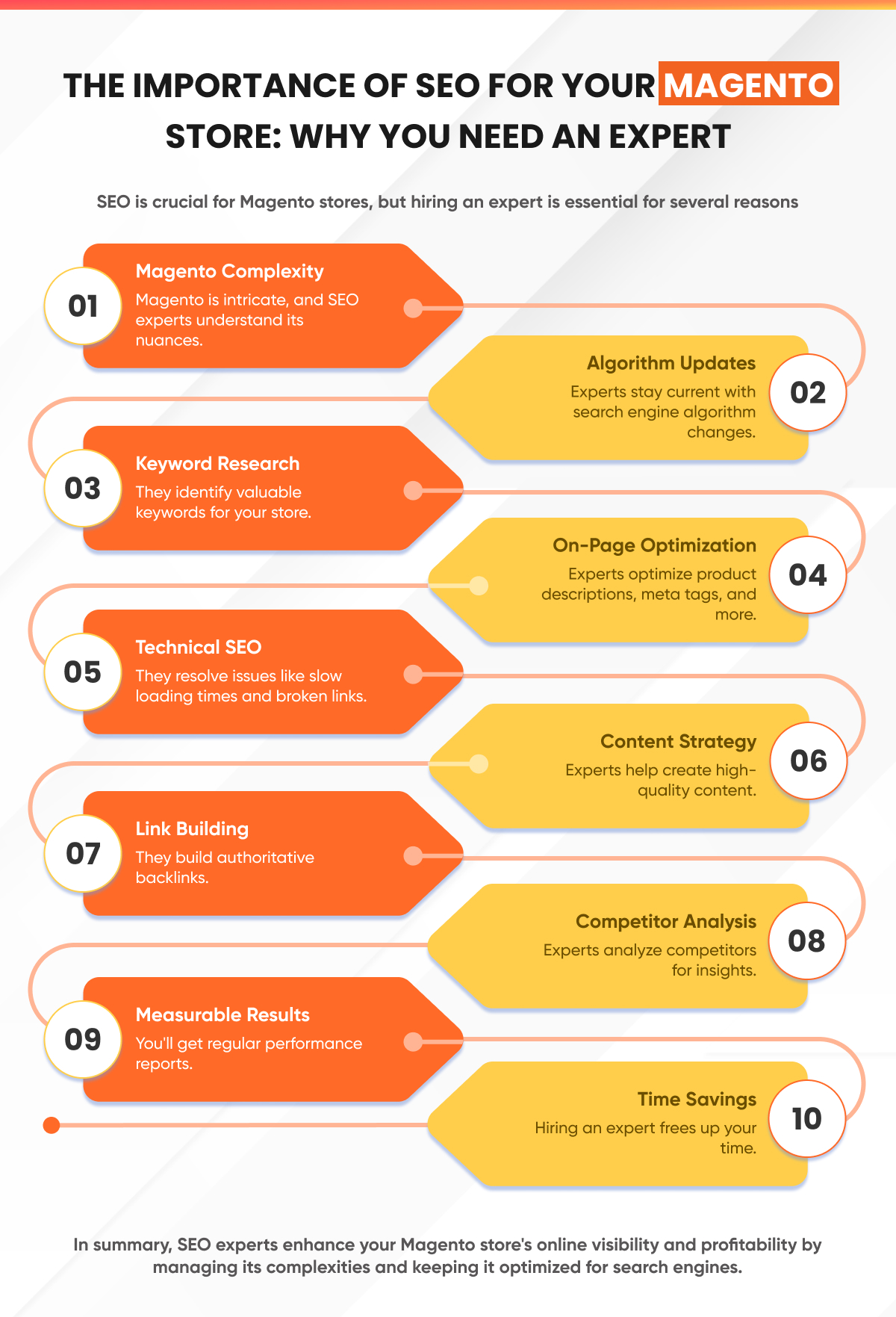Last Updated | October 5, 2023
When it comes to optimizing your Magento e-commerce store for search engines, having the right SEO expert on your team is essential. In this brief guide, we’ll explore the key steps to help you hire the perfect Magento SEO consultant who can elevate your online business to new heights. Let’s dive in!
Why Hiring of SEO Expert is Good for Business?
The level of comfort that we enjoy today was not something that the world expected. We did, however, expect to live in a world powered by technology, but the conveniences we can benefit from today did not ever cross our minds.
For business owners, things have gotten very simple. They can easily set up a digital business with the assistance of innovative tools and expert professionals. Digital marketing agencies are springing up from every corner of the world.
Magento SEO consultants, SEO experts, and PPC campaign creators, and many other entities have added the highest level of convenience for business owners. Where it would take thousands and sometimes millions of dollars to set up a business now require a couple of hundred dollars to start and run a business.
The Era of Technology, the Power of Digitalization
The world is moving towards advancement at a fast pace. Every industry in the world has to keep up with the pace. Failure to do so will never let business get ahead of the competition. From the automotive sector to the corporate world, and from communications to the retail industry, every industry is under the strong influence of technological advancements.
One of the most powerful products of technology and innovations is, of course, digitalization. It is encouraging businesses to establish a presence in the digital world, especially retail stores. If a business does not exist in the digital world, it does not exist at all for a modern consumer. It is due to this reason; the concept of eCommerce websites is gaining such momentum around the world.
Who would have thought they would be able to shop from their favorite stores without the need to get out of bed, let alone the house? We have the technology to thank!
Read Also Shopify SEO Tips
With the number of eCommerce businesses skyrocketing today, programmers and app developers are launching tools that make it easy and simple for brick-and-mortar retail store owners to step into the world of digital retail. These tools encourage entrepreneurs to set up their own businesses with minimum monetary and non-monetary efforts.
Shopify, WooCommerce, BigCommerce, YoKart, and, most importantly, Magento are super-efficient and innovative tools that make buying and selling online convenient for both customers and business owners.
The Importance of SEO for Your Magento Store

Understanding eCommerce Platforms
Instead of hiring website developers, businesses are inclined towards eCommerce platforms such as Shopify, WooCommerce, or Magento. These platforms not only eliminate the complexities involved in website development, but they make online retail stores the easiest to set up. There are innumerable benefits of choosing these platforms instead of investing hundreds and thousands of dollars in creating a website.
An eCommerce platform is a dynamic tool that allows users to manage their website, online business operations, marketing, and sales with ease and efficiency. These platforms serve as the Homebase to a business. Using an eCommerce is a smart option as it offers some powerful features that you need to run a business like a pro.
It allows business owners like you to centralize their operations and run their business as they please. The eCommerce world is evolving at a breakneck pace, leaving on-premise technology far behind. The best thing about these eCommerce platforms is that you do not have to hire a technical team for the development of a seamless eCommerce website.
Many of the low net-worth entrepreneurs are unable to hire such services due to a limited budget. These platforms allow business owners to set up their digital retail stores without extensive technical support as they do not require any complicated coding to start functioning.
There are two types of eCommerce platforms, and these include Open Source eCommerce platforms and SaaS eCommerce platforms. When choosing eCommerce platforms, many business owners fail to make a choice between these two. However, it is important to understand the key differences between these two types of eCommerce platforms before a business owner makes a choice.
Before we get into the details, we need to understand the concept of SaaS. It stands for Software as a Service, and it is a model revolving around software licensing and delivery. In this scenario, the software is licensed on a subscription basis. In other words, it is hosted or web-based software. Instead of buying or installing it, these platforms are hosted by third parties in the cloud.
The feature that makes eCommerce store owners choose SaaS platforms is that they are built, hosted, and maintained on the server of the eCommerce providers. On one hand, it is an excellent feature as the user does not have to maintain it themselves; on the other hand, it limits a user’s ability to alter the source code. Some of the best SaaS eCommerce platforms include Shopify, BigCommerce, Squarespace, BigCartel, and Volusion.
What is an Open Source eCommerce Platform?
The second type of eCommerce platform is an Open Source eCommerce platform. These platforms offer functionality that a SaaS eCommerce platform does not offer. A user of an open-source eCommerce platform has the power to alter the source code from their own server. It is developed collaboratively. The fact that these platforms allow users to not only view but also make changes to the source code makes them a top choice in the world of eCommerce.
Choosing an open-source platform is a smart option for business owners exploring options to establish their retail stores online. With these platforms, users do not have to deal with vendor lock, which means they do not have to pay a substantial licensing fee and can enjoy full control of their projects. There is no denying there; that visual appeal is one of the significant factors when it comes to building customers on an online store.
Uniqueness is the key to standing out among the hundreds and thousands of eCommerce websites in the market, and an open source allows users to do just that. Business owners can easily customize their online platforms according to the niche of their business. Payment gateways, CRMs, shopping channels, shipping vendors, and accounting software can all be easily integrated into the website.
WooCommerce, OpenCart, Prestashop, and Magento are the best open-source eCommerce platforms available in the market. Out of all these open-source platforms, Magento eCommerce is a platform that takes the lead with its amazing features.
Magento, A Powerful Tool for Retailers
It can be said that an open-source eCommerce platform is a better option as compared to SaaS eCommerce on many levels. It is suitable for many businesses, but to step into the market with a bang, an open-source platform is the one to choose. There are innumerable open source platforms that offer business owners exceptional features, but Magento eCommerce is what you need to choose.
It is an open-source platform that offers a variety of CSS customization options that you can use to design your eCommerce website. Moreover, this platform offers a business owner a chance to create a fully Magento responsive web design. We all know how important it is to have a responsive web design to stay at the top of the competition. It even aids a business’ Magento SEO efforts.
It is much easier to rank higher on a Search Engine Result Page – SERP with Magento as compared to any other e-commerce platform. Other features that make Magento the best choice include multi-currency and language support, third-party Magento integration, flexibility, with simple and intelligent coding.
All these features make Magento a top choice for business owners. Are you thinking about choosing this eCommerce platform for your online store? Well, before you get started, there is one thing that you need to consider, and that is how are you going to carry out SEO in Magento? Yes, it does offer features that aid SEO efforts, but you will have to work on its SEO just like any other website.
If you do not optimize your site as per the search engine guidelines, your store will never appear on the top of the SERP. If you want to outshine your competitors, you need to think about hiring a suitable Magento SEO consultant.
In order to choose an SEO service provider for your eCommerce website, you need to have a clear concept of what SEO Magento is and what factors you need to consider when choosing an SEO professional for Magento.
Hire SEO Expert – Take Your eCommerce Website to the Top
Whether it is a small-scale local online retail store or a globally known retail brand, all types of businesses need to get at the top of a SERP if they want to generate sales. Many brick-and-mortar store owners believe establishing a Magento eCommerce store is the only thing they need to do. However, this not a wise approach. If you are thinking that just developing an eCommerce store will get you more customers, you need to rethink your entire strategy.
Yes, an eCommerce store has opened doors to the $4.88 trillion pie of eCommerce sale in 2021, but to really enjoy the benefits, you need to do much more than just setting up a Magento eCommerce store. You need to work on your website’s SEO.
SEO is an acronym for Search Engine Optimization, and it one of the best digital marketing strategies that take a website to the top. It helps an online business generate increased organic traffic. Without making a substantial monetary investment, companies can enhance their business’ visibility and attract a wider audience.
With this Magento SEO guide, you will not only get a chance to understand what SEO in Magento is but also help you gain sufficient knowledge that will help you hire the best consultant for your Magento eCommerce store’s SEO.
Magento SEO Guide
The best eCommerce consultants and experts agree on the fact that Magento is the most search engine friendly platform to date. However, there is still some room for improvement in Magento-based websites that can boost its SEO. There are three basic sections of SEO for Magento, and these include basic technical optimization, header settings, which are then followed by advanced Magento SEO and duplicate content.
How to Hire a SEO Expert for Magento?
There are a plethora of technicalities involved in SEO for Magento. As a business owner, it is close to impossible for you to address all these technicalities together. From accounts to finance, and from customer service to product management, there is so much on your head. Yes, managing an eCommerce store is easier than running a brick-and-mortar store. However, it does not mean that you can establish a stable online store without putting in any effort.
SEO is crucial for the growth of digital business, and negligence in this area can cost you your website’s SERP rank. Instead of divided attention, it is smart to take care of areas that you are proficient at. Besides, some matters are best left for the professionals to handle, right? If you want to take your business to the top, you need to work on all areas of the business to make it stand out among the crowd.
While you manage the core responsibilities of your business, a Magento SEO consultant will handle the matters surrounding the standing of your eCommerce store in the digital world.
Now, the question is, how to hire a Magento SEO expert? You need to focus on some essential factors of consideration while choosing an SEO expert for your Magento-based eCommerce store.
Industry Expertise
The first and foremost factor of consideration in this process is industry expertise. As the concept of digital business gains momentum across the globe, SEO agencies have begun to spring up from every corner of the world. Finding the perfect SEO expert in the sea of SEO professionals is a daunting task.
Therefore, start by enlisting SEO consultants that specialize in SEO for Magento. There are innumerable SEO professionals, but all offering expertise in the Magento eCommerce SEO. The professionals you hire must be well-versed in SEO, specifically for Magento-based eCommerce websites.
The industry-specific experience can prove to be of considerable help to your business. These professionals are aware of what the competitors are doing, which gives a business owner a chance to overshine the competitors through smart strategies.
Experience
Now that we have talked about the importance of industry expertise, there is another factor that you need to consider, and that is the experience. Hiring an amateur SEO consultant can help you take your business to the top, but overcoming hurdles arising midway is not something these young professionals can do. It is due to this reason you need to hire SEO consultants for your business who hold years of experience in the industry.
As these SEO consultants have worked in a variety of different industries and dealt with unique matters, it bestows upon them an ability to get past any obstacles and hurdles. They have enjoyed health exposure to the industry, which can prove beneficial for your business.
Reputation
The third factor that you cannot overlook is the reputation of the consultant. If you want to know if an SEO consultant is reliable, you can find reviews from their former clients. There are several online platforms where you can inquire about the reliability of SEO professionals. You can navigate to their website and look for reviews there, or you can even look for reviews on Google.
Try making a search query with the name of the consultant or the firm. It will help you determine if a professional is worth investing in or not. Remember, analyzing the reputation of an SEO consultant can save your business. You can start by navigating to their former clients’ stores and analyze the quality of their work from the performance of the eCommerce websites they have previously worked on.
Strategy
Magento itself is a powerful tool that is search-engine friendly. However, without using smart strategies, even the features of Magento will not work for you. To enjoy the full benefits of Magento, you need an effective and genius strategy. When hiring an SEO expert for your Magento-based eCommerce store, discuss the possible ways a consultant can up your SEO game. Make sure the consultant has the skills to create powerful and unique SEO strategies for your business.
These are the four most crucial factors that can help you choose a Magento SEO expert that possesses the potential to take your business to the top. Make sure you choose the right professional as the wrong choice can take your business back to square one!
Important SEO Terms for Magento eCommerce
To make things easy for you, we have compiled a list of the essential SEO terms that you come across when working on improving the digital footprint for your Magento website.
Meta Description
When you enter a search query in the search bar, you see a list of all relevant URLs. Just below the header of the link, you see a single-liner, which is a summary of the webpage. You read that to decide if a link is relevant to your search or not. The one-liner that summarizes the webpage is the meta description. It does not influence the SERP ranking, but it does help in encouraging a searcher to pen a website.
Content Structure
Content structure is another common term that will appear in the Magento SEO guide. It revolves around the tags’ hierarchy where H1 comes first and is followed by H2 and H3. These are the Magento tags SEO needs to help the web crawlers understand the content better.
Page Speed
When it comes to SEO, page loading speed is one of the most important factors of consideration. The average loading speed for eCommerce webpages is ten seconds. Users expect webpages to load faster than ten seconds. If a webpage loads at a very slow speed, a visitor will abandon the website and navigate to a competitor website.
Duplicate Content
When dealing with Magento SEO, duplicate content is something you will come across a lot. Duplicate content is when the same content appears on more than one webpage. It can negatively impact the ranking of a website on a SERP.
These are the basic terms that you need to have a clear understanding of, as these are a crucial part of SEO for Magento.
Audit and Analyze Existing Website
If you have an existing website, you need to analyze the current situation of the site. Carrying out an audit of the website helps business owners create a smart improvement plan. The areas that you need to focus on your website domain, structured data, content, sitemap, title tags, meta descriptions, and page speed.
Did you know that search engines only index www or non-www, and HTTP or HTTPS versions of a website? Well, you can get rid of these errors by navigating to the web setting.
When dealing with Magento, duplicate content is one of the most frequently occurring problems. By updating your domain, you can address the issue. A perfect solution to solve the problem of duplicate content is to enable a canonical link meta tag for categories. Another area that you need to direct your attention to is the structured data of your website. There are various free testing tools that allow you to check the status of your website’s structured data.
To complete your website’s audit, you need to include an XML sitemap. It can boost the technical aspect of an SEO strategy. The search engine crawlers use the XML sitemap to explore a website, and the absence of this can make crawlers miss many of your webpages. There is an in0built tool in Magento that can help eCommerce business owners generate an XML sitemap to be submitted to a search engine.
Next in line are the headers and title tags. If you have used Magento before, you might be wondering what’s the point of doing this manually when Magento can automatically create headings and title tags. When you consult an SEO expert for Magento, they will suggest creating the title tags and headers manually.
The most straightforward and easy methodology to do this is by creating different product groups. It is a useful technique as it will help you predefine title tags and assign per product groups. The right approach in this stage is the proper usage of the title tags that follow a clear hierarchy such as H1, H2, and H3 tags.
Meta descriptions provide your potential customer with a summary of a webpage that determines whether an online surfer will open your website or not. Last but not least, page speed is extremely crucial. On average, an online surfer waits for three seconds for a page to load. If your webpage does not load within three seconds, a visitor will abandon your website.
Now that you know which areas of your website, you have to focus on during the website audit, you can start working on your eCommerce store’s SEO.
Step 1: Thorough Research
The first and the most crucial step in SEO for Magento is keyword research. Many business owners believe that keywords have lost their power as search engines do not rely on keywords to rank websites. The search engines do have strict policies for keyword stuffing, but they have not entirely discarded the use of keywords.
Therefore, start your SEO efforts by thorough research for keywords. The time you invest in keywords will help you create product pages that attract maximum traffic. It will help you generate valuable traffic to your website, who actually have an interest in your product.
There are a variety of different tools that you can use for your keyword research. Some of the best tools in the market include Ubersuggest, KeywordsFX, Answer the Public and Keywordtool.io. These tools will help you make smart choices based on search volume, cost-per-click, and competition.
One of the most crucial aspects of keywords is understanding of the target audience. Businesses who have clearly defined customer persona know what their target customer will search. They use their knowledge about customers to set their keywords.
You have found the best performing keywords? Well, it is time to study your competitors. A critical part of your research is understanding the competitors and analyzing their moves. The smartest way to beat your competition is by staying close to them. When it comes to SEO for Magento, assessing, and understanding your competitors is a crucial part.
Start by creating a list of your competitors. Try to go through the product pages of all your competitors. By analyzing and thoroughly going through these pages will help you understand their keyword strategy. You will know which keywords are they targeting and which websites are creating a stream of customers for their site.
Sometimes analyzing a competitor can teach you what not to do with your SEO strategy. Make sure you keep a close eye on what your competitors are doing as it will help you up to your game.
Step 2: Revamping Product Categories
The primary stages are now complete. You have carried out an audit for your website, and you have done your research. The next step of your Magento SEO Optimization is revamping and revising the product categories on your eCommerce store. Many business owners overlook this step, and this is a huge negligence on their part.
For SEO of a Magento-based eCommerce website, the product categories are not a part of being overlooked. Product categories assist search engines in understanding your business and even helping them assign it rank on their SERP. Moreover, it is vital to please customers. Customers can easily navigate around your store.
When they know where they can find their product, it helps them save time and even instills high satisfaction levels among them. The smartest approach is to direct your focus towards revising your product categories.
The areas that you need to focus on include name, description, title tag, and meta description. The name of the category must be descriptive and concise at the same time. The more organized your catalog is, the more pleased your customer will be.
The description is another essential part of the product category that requires your attention. You can include your keywords here and make them as much informative as you can. Make sure you keep a modest number of keywords into it, as keyword stuffing will negatively impact your SEO efforts.
The title tag consists of 60 characters, ideally with a primary keyword and the brand name. Try to be creative and use it for the benefit of your business. Last but not least, the meta description needs to be enticing and offer value to the customers. It is your meta description that will encourage a customer to click on your website. Include the primary keyword into it for the best results.
Step 3: Revisiting and Revising Product Pages
After you have carried out thorough keyword research and assessed the competitor website, it is time to revise your product pages. It is important for eCommerce store owners to stay updated about their competitors as it gives them an edge over them.
When working on SEO for your Magento-based eCommerce store, optimizing the product page as per the market is essential. If your product pages are not that outdated, simply giving it a trendy look is an acceptable approach. However, if these pages require major changes, the best option is to create new pages.
Several factors can collectively help you improve your product pages and help your eCommerce store rank high at a SERP. Start by choosing a descriptive product name. When creating a product name, you have to keep your target audience in mind. It should help your potential customers understand the product.
Try including the primary keyword, but it should not look forced or stuffed. It is a stage that requires business owners to get creative. The next factor is the product description. The description must be informative, and the words used must be powerful enough to drive a reader to make a purchase.
Remember that a description that is too wordy can bore the visitor and make them abandon the store. You need to keep the description concise but descriptive and attention-grabbing.
Other features that can elevate the quality of your product page includes creative title tags and meta descriptions that can keep a customer hooked. Developing a concise URL and including social media buttons are some other smart moves that can make your product pages compelling to your audience. To build customer trust, you can include a series of shopper reviews and add high-quality and impressive images of your products.
To boost your SEO efforts, do not remove a page for a product that goes out of stock. Instead, add a notification about restocking the product soon and add links to similar products on your website.
Step 4: Improve the Page Speed
The next factor that plays a prominent role in your eCommerce store’s SEO is page speed. None of the online surfers like a website that loads at a very slow speed. The consumers of today want everything to happen in a matter of seconds. The page loading speed is one of the most important factors when it comes to optimizing websites for a high rank on a SERP.
If a webpage takes more than five seconds to load, it is too slow for a consumer. The average page speed for eCommerce platforms is 10 seconds, but an ideal speed is three seconds. Fast loading webpages considerably reduce the bounce rates, which directly impacts the SERP rank of a website.
Therefore, for SEO of your Magento-based eCommerce store, you need to work on improving the page speed. The factors that impact the page speed include image size and the number of Magento SEO extensions. Some of the most effective ways to improve the page speed include compressing product images, enabling a flat catalog, and using full page caching. However, you need to choose the Lazy Load Magento SEO extension, which delays the loading of images to enhance user experience. With this extension, an image loads as a user scrolls down the page.
A common mistake that eCommerce store owners make is using a variety of different Magento extensions development. These extensions do help in creating a smart website, but it can considerably reduce the page speed. You need to understand that satisfaction and happiness of the visitors is the primary purpose of eCommerce. Try to use the most important extensions and avoid using unnecessary features as it can negatively impact the page loading speed.
Step 5: Google Analytics Code
The final step of SEO for Magento is adding the Google Analytics code. It is the step where you have to add tracking code from Google Analytics to your eCommerce website. You can easily access the code from your Google Analytics account and add it to your Magento website.
It can help you monitor website performance. It provides you with actionable insights that allow you to take smart steps that help in improving the overall performance of the website that enhances your visibility in the digital world.
Before you hire a Magento SEO expert, you need to have a basic understanding of the process. It helps you better understand the SEO strategy a consultant comes up with, and you can even save yourself from getting trapped into a fraud.
Bottom Line
The question is no longer whether to establish an online presence or not, but how to establish a strong digital footprint. The smartest option fr retail store owners to start working on their eCommerce stores. Magento eCommerce platform is the perfect way to get going with an eCommerce website with ease and convenience.
However, beating the competition and gaining the top rank still requires extensive SEO efforts for which you need to hire SEO experts who specialize in Magento platforms.
The guide was prepared to help you make the right choice when hiring the best Magento SEO consultant for your business. Before you get into the process and start looking for an expert, you must have a thorough understanding of what SEO is and how it can help your Magento store get ahead of the competition.
FAQs:
-
How to SEO optimize a Magento storefront?
Even though Magento itself is a search engine-friendly eCommerce platform, users still have to design a smart Magento SEO schema. There are several ways you SEO optimize your Magento storefront. Some of the most effective ways include utilizing headers and title tags, optimizing product page URLs, elimination of duplicate content, creating a Magento SEO XML and HTML sitemap, powerful meta descriptions, and optimizing the homepage title.
-
What should I know about using configurable and simple products in Magento?
It is a question that you will come across when using a configurable product as well as simple variants for a single product. In this case, avoiding creation fo duplicate content must be a consideration. While doing so, you need to ensure that the Magento configurable product best SEO canonical tag used on each of the simple products points back to the primary configurable version.
-
Will deleting products on Magento 2 affect my store’s SEO?
If you are wondering whether deleting products on Magento 2 without affecting SEO is possible or not, the answer is yes. You can delete the products and improve the performance of your store as it will reduce the load on Magento. It will enhance your page speed. Also, a 301 redirect to the homepage is necessary as it enhances user experience and reduces bounce rates.
-
What is Magento SEO pagination?
It is an extension in Magento eCommerce development that implements all Google recommendations to target pagination issues in SEO. Enabling this extension will help you optimize your category pages for most search engine robots. It improves the way search engine crawl and indexes your website, and it becomes easy for search engines to understand your store structure.
4. Shopify wholesale app development company vs. Magento B2B eCommerce platform: Which one is best for a large organization?
With Shopify, the larger enterprises will have around $2000 costs monthly. On the other hand, the Magento Enterprise edition tends to be more on the expensive side that has an annual price range from $22,000 to $125,000. For large organizations, Magento is better for creating a personalized user experience, while Shopify is better for small and medium stores looking to quickly make it into the ecommerce market.
Source: https://ecommerce.folio3.com/blog/magento-seo-consultant/









